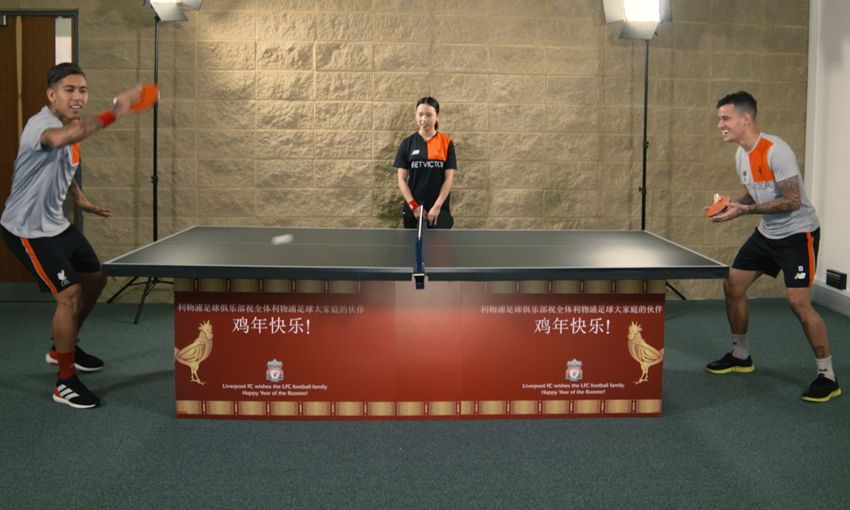Elite Canadian table tennis players are very similar to a lot of our imported goods: they also come in China. Four of those five athletes representing Team Canada in the Olympics were initially from this Asian superpower. On very top of the national rankings also, Chinese players rule: they represent seven of the top 10 men's table tennis players, and six of their best 10 girls. Canada is by no means alone in this scenario: all Team U.S.A.--both people--were educated in China, and moved into the continent as adults. Get more information abbout us ong Okru: https://ok.ru/bestpingpongtablepaddlerobot
1 reason behind this hegemony would be China mass-produces dining table tennis uber-athletes as though they were moving out of fashion. Considering that the game was first introduced to the Summer Olympic Games in 1988, Chinese gamers have won 16 of their 20 available golds. They also cause the world ranks: the best four guys on the planet are out of China. The very best male player on earth, 24-year-old Wang Hao, that retains his racquet like a set of chopsticks in what is called the penholder grip, continues to be No. 1 in the world for 10 consecutive months, and is now widely expected to win gold in the summer's Games. For those girls, the problem is much more conspicuous: all the top five girls in the world are Chinese, and lots of the planet's competitions end together with the team winning each of the awards that are available.
Considering that the Chinese are so far better in Ping-Pong compared to the rest of the planet, there are a lot of elite players in China who are not great enough to play for the national group, but could conquer the competition out China. This results in is "Ping-Pong immigration," explains Tony Kiesenhofer, director general of Table Tennis Canada, together with less-than-top-notch Chinese gamers shifting allegiances, and moving overseas to represent another nation. "You go into a game between Poland and France," states Dan Seemiller, a mentor of the U.S. men's group, "and it is only Chinese gamers playing against each other"
This circumstance is really a double-edged sword. On the 1 hand, Ping-Pong legislation brings ability into nations such as Canada and enhances the general quality of the game. Trainers and coaches are given funding depending on their effects on the global circuit, therefore it is important to get the very best in the nation no matter where they have been educated. But as soon as the top places visit recent Chinese immigrants, there's less of an incentive to come up with homegrown talent, states Ron Edwards, executive director of the Manitoba Table Tennis Association.

And Canadian-born gamers find it more difficult to win and compete. As soon as they have their newspapers sorted, Chinese gamers discover they can begin controlling national contests. And on the global circuit, they "frequently spend the place" of their Canadian-born players, '' states Remi Tremblay, the direct mentor of Club Tops p Repentigny, among the very best dining table tennis clubs in Quebec. Though this might be great for global outcome, it may leave players frustrated and disappointed, he adds.
Eighteen-year-old Shen Qiang says he came in Canada in 2004, and soon afterwards started winning Canadian junior contests. This summer he'll be a proud representative of the Canadian Olympic team. While he did not immigrate explicitly to his table tennis career (he arrived with his loved ones, who reside in Toronto), he's happy with Table Tennis Canada's sports program, also is anticipating the autumn opening of this new 24-hour training center in Ottawa, so that he could work harder on his game. Produced in Jixi, in northeast China, Shen first picked up a paddle. By age 11, he'd left home and quit school to proceed to Harbin, a town 300 km away, to train fulltime and reflect the state of Heilongjiang. The contest at China was extremely extreme, '' he states. The athletes coached six hours every day, five days per week; they had been paid to train fulltime and compete, '' he says. "In China, it is very aggressive because in the event that you do not make results then you'll be removed from the group, and if you do not have table tennis without a college, there's not any potential for ping pong table pingpongstart.com."
Though this seems extreme, it's a game system other nations are happy to observe and comprehend. To understand how to compete against the very best, most nations, such as Canada, have their very best table tennis players prepare for a couple of weeks or more in China. While the Chinese authorities will not offer access for their absolute greatest athletes, much the lesser players supply exceptionally stiff competition. Twenty-year-old Pierre-Luc Hinse is a fulltime Canadian athlete, also in his endeavor to make it into Beijing (that he simply missed), he's attended some of those Chinese table tenniscamps. In the summer of 2001, he moved to a in Zhengding, a historic city three hours southwest of Beijing. The camp was challenging work, mentally hard and draining, Hinse states; nobody enjoyed the food, and also the intensity and six-hour-a-day training program were gruelling. The Canadians were not even playing the federal group, but they were nevertheless outclassed, states Hinse, that had been rated first in Canada in the cadet level at that moment, but is currently ranked ninth at a senior level. "It was awkward," he adds. The top Canadian players couldn't maintain against the Chinese. What made it worse was that the Chinese gamers could laugh at the Canadians if they missed the ball. "Some gamers were considerate, but others could benefit from us. It was just like we were novices," he says. "They could do this since they're the very best on the planet, but for us, it was hell. We only wanted to come and leave home."
To give other players a opportunity to compete and also to handle "Ping-Pong legislation," that the International Table Tennis Federation (ITTF) has chosen to intervene and adjust the competition rules. Beginning in September, there'll be new eligibility standards. In case a table tennis athlete immigrates, then he or she'll need to wait a time period prior to representing a brand new state, based upon the athlete's age. Gamers under 15 will need to wait three years before competing to get their new nation. That amount rises to five years for gamers between 15 and 18, and seven years for gamers 18 to 21 decades old. Over 21, a participant can not play for another nation at certain global events. Most nations supported the rules, states Rudi Sporrer, the chairman of the rules committee to the ITTF. "Something needed to be done in order to create younger table tennis trainers rather than simply attract adult athletes in by China," he states. (Contrary to their achievement about the courts, the Chinese don't control the International Table Tennis Federation; it functions on a one-country-one-vote foundation)

Canada was among those nations in favour of their eligibility limitations, states Kiesenhofer. Many nations were importing Chinese Ping-Pong celebrities, fast-tracking citizenship and fulfilling their positions with these elite gamers. This was prevalent in Europe, where gamers make large paycheques in professional leagues. Nations such as Canada that refused to perform this were being placed at a disadvantage, he states, as well as the new laws gives all states the exact same set of principles. (TableTennis Canada doesn't fast-track the citizenship of Ping-Pong celebrities. But, athletes generally play Canadian contests, and put on a national ranking prior to the three- to five-year procedure is complete.) Find us on twiiter: https://twitter.com/bpingpongpaddle
Irrespective of how they influence Europe, many consider the principles will reshape the Canadian Ping-Pong picture. Eighteen-year-old Marie-Andree Levesque left home in 11 to compete in high level tabletennis, moving out of the little town of Matane, Que., to Quebec City, where she lived with her trainer and his loved ones, then to Montreal, where she dwelt with her physical education teacher so that she would attend an elite sports college. Though she has dedicated the greater portion of her life to table tennis, she's one of the players that find it tough to compete against the Chinese-trained athletes that dominate the Canadian positions. At present, she's ranked 22nd in the Canadian farmers and 11th for its under-21s. Her very best result was in the 2007 El Salvador Junior Open where she finished fifth at the event and ninth at the singles event. She trains 23 hours each week, in the Centre de performance en tennis de table de Montreal, also receives tens of thousands of bucks from Sport Canada. It is not sufficient, but to pay the expenses of these flights, the lodging, and the entry fees to international competitions, she says, along with her parents also contribute a few thousand dollars so that she could pursue her dream. Having lost so much, she's anticipating the implementation of the rules. "It provides an opportunity for Canadian-born gamers to be on the group. It'll be easier for folks like me to perform for Canada."




















